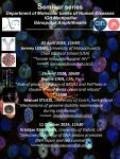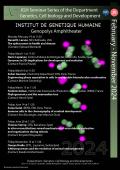A two years postdoctoral position is available to understand the molecular basis at the origin of multiple myeloma (MM) by studying the genomic instability generated by the functional interaction between the transcription and replication machineries, at the level of DNA/RNA hybrids(R-loops). The study will focus on the role of Ddx19 RNA helicase, which the host team has shown to be required for R-loop resolution in this process (Hodroj et al., EMBO J. 2017). The candidate's mission will be to study the role of Ddx19 in the resolution of R-loops in MM cell lines, the molecular interactions of Ddx19 with R-loops and chromatin as well as the subcellular localization of Ddx19 after replicative stress induced by DNA damage or by activation of oncogenes.
A very good experience in biochemistry, molecular and cellular biology is required.
-Motivation and passion for science.
-At least one publication of good level (IF> =8) as the first author resulting from the work of thesis.
- Autonomy
-Organization and communication skills
- Ability to work in a team
- Mammalian cell culture
- Chromatin Immunoprecipitation
The Institute of Human Genetics offers an exceptional scientific environment with 22 research teams. One of the major areas of research developed at the institute is genome dynamics and epigenetic control. The main aspects of this research concern DNA replication, maintenance of genome integrity, recombination and meiosis, chromatin and nuclear organization.The project will be developed in collaboration with 4 other groups of the Institute.




